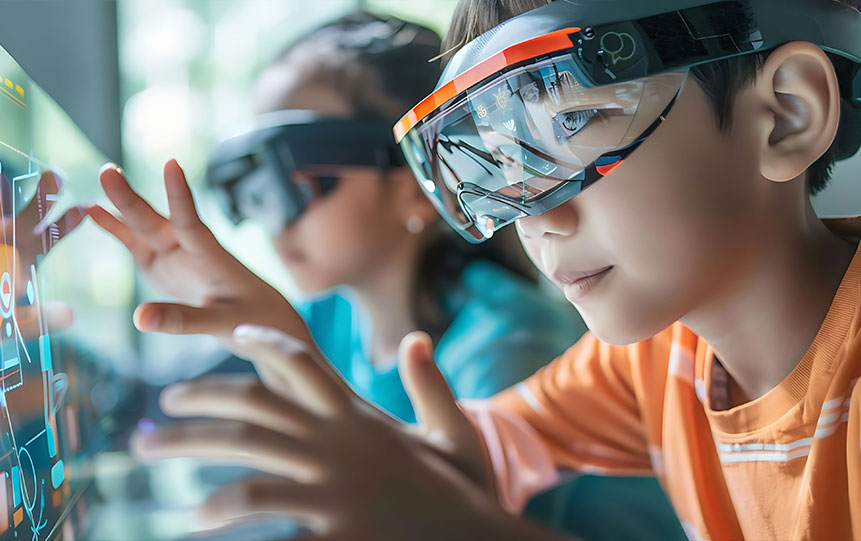Oct 14 2024
How AI Is Shaping the Future of STEM Education in Rural America

VP Content & Delivery Solutions

Oct 14 2024

VP Content & Delivery Solutions

STEM education is the foundation of innovation, driving the future of industries such as technology, healthcare, and engineering. In this digitized world, a strong STEM education is more important than ever to prepare the next generation for the challenges and opportunities ahead. However, rural America faces unique hurdles in providing quality STEM education, from limited resources and technology to a shortage of qualified teachers.
Despite these obstacles, artificial intelligence (AI) is emerging as a powerful solution to transform how STEM is taught in rural areas. By harnessing AI-based educational technologies, rural schools can overcome barriers, giving students access to personalized learning, virtual labs, and intelligent tutoring systems that bridge the gap between rural and urban education.
The role of AI in enhancing STEM curriculum development goes beyond merely introducing new technology—it’s about leveling the playing field and ensuring that students in rural communities have the tools and opportunities to thrive. This blog explores the educational challenges in rural America and how AI is revolutionizing education, making it possible for students in even the most remote areas to engage with cutting-edge STEM learning, preparing them to be tomorrow’s innovators.
Rural schools in the United States face unique challenges that hinder the delivery of effective education, particularly in STEM fields.
These challenges significantly impact STEM curriculum development and the ability to prepare students for STEM-related careers, creating a gap in educational quality between rural and urban students.
AI-powered solutions help overcome these challenges, bridging the gap between rural and urban education. Here’s how AI is making a difference:
1. Personalized Learning Platforms
AI-powered personalized learning platforms use adaptive learning algorithms to tailor lessons to the individual student’s needs. These platforms adjust in real time based on student performance, ensuring that students in rural areas receive customized instructions that match their learning styles and paces.
2. Virtual Labs and Simulations
In rural schools where physical lab resources are limited, AI-enabled virtual labs provide students with hands-on learning experiences. Their interactive simulations allow students to conduct experiments in a safe, virtual environment, which enhances their understanding of scientific concepts without the need for expensive equipment.
3. AI Tutors and Assistance
AI-powered virtual tutors can provide additional support for students struggling with specific STEM concepts. These AI tutors offer one-on-one assistance and 24/7 availability, ensuring students in rural areas can access help when needed, even if teachers aren’t available.
4. Bridging the Gap Between Rural and Urban Education
AI for STEM is not just about technology; it’s about equalizing opportunities. AI-powered tools can help level the playing field for rural students by offering access to high-quality STEM education that rivals what’s available in urban areas. AI-based tech solutions are scalable and cost-effective, making them a viable option for rural schools with limited budgets.
Studies have shown that AI-powered personalized learning tools can significantly improve student performance in STEM education. For example, one study found that AI-based interventions helped undergraduates pass STEM courses at a rate of nearly 91%, compared to 73% for those who did not receive AI-based support. Another study reported an 11% improvement in academic performance in STEM subjects after implementing AI-driven educational tools. So, it can be said that by using AI, rural schools can close the achievement gap, ensuring students are better prepared for future careers in STEM fields.
MRCC EdTech offers several innovative solutions to enhance the STEM learning experience, particularly in rural areas. Here are some key solutions we provide:
1. Immersive Learning Technologies
MRCC EdTech leverages Augmented Reality (AR) and Virtual Reality (VR) to create engaging and interactive learning experiences:
2. Personalized Learning
MRCC EdTech uses adaptive learning algorithms to tailor educational content to individual student needs:
3. Cost-Effective Content Creation: MRCC EdTech’s AI-powered platform streamlines the development process, reducing production costs and making high-quality AR/VR content more accessible to schools with limited budgets.
4. Curriculum-Aligned and Immersive Learning Experiences: MRCC EdTech works closely with educators and subject matter experts to develop engaging and interactive AR/VR experiences that align with specific learning objectives and curriculum standards. This ensures that the content is relevant and up-to-date with the latest STEM curricula.
5. Accessible and Inclusive Design
MRCC EdTech focuses on making our solutions accessible to all students, regardless of their location or socioeconomic status. We offer DEI&A-proof content solutions ensuring that all students, including those with unique learning needs, can benefit from immersive learning experiences.
These solutions help address the challenges faced by rural schools, such as limited access to resources and outdated infrastructure, ultimately enhancing the STEM learning experience for students.
As AI continues to reshape education, it presents a unique opportunity to revolutionize STEM education in rural America. MRCC EdTech is committed to providing rural schools with the tools, resources, and expertise they need to prepare the next generation of STEM innovators. To learn more about how MRCC EdTech can enhance STEM education in your community, contact us today for a consultation and discover how AI can transform your students’ futures.
Leave A Reply
Your email address will not be published. Required fields are marked *